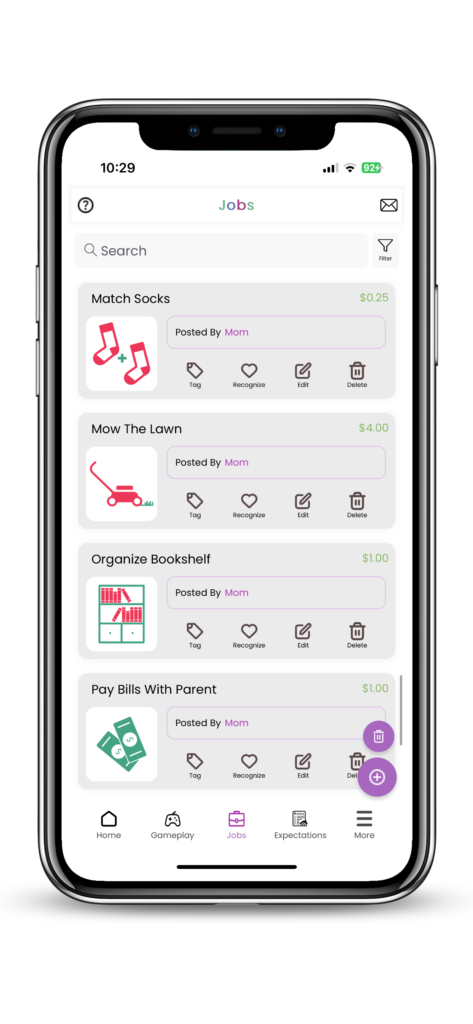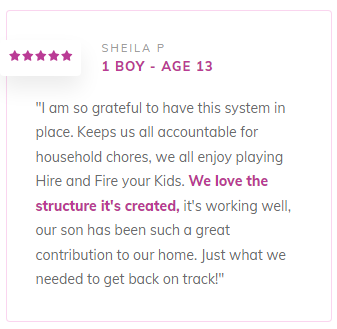At 11 years old, children are developing more independence and are capable of handling a variety of household chores. Assigning these tasks not only helps them build responsibility but also teaches valuable life skills.
Discover age-appropriate chores for 11-year-olds that help foster responsibility and independence.
Chores by Category
Simple Chores
- Making their bed
- Sorting laundry
- Watering plants
Intermediate Chores
- Folding laundry
- Emptying the dishwasher
- Taking out the trash
Advanced Chores
- Cooking simple meals
- Walking the dog
- Cleaning the bathroom
How Much Should a 11 year-old get paid for chores?
It’s important to balance fair compensation with the learning value of the chores. Here’s a suggested price per chore for 11 year olds:
| Chore Type | Suggested Payment |
|---|---|
| Simple Chores | $1 – $2 per task |
| Intermediate Chores | $2 – $4 per task |
| Advanced Chores | $4 – $8 per task |
Are You Paying Your Kids the Right Amount for Chores? We have an amazing guide for you. You’ll discover what each individual chore is worth.
How to Manage Chores with Hire and Fire your Kids: A Step-by-Step Guide
Managing chores can be seamless with the Hire and Fire Your Kids app where your kids can learn through play. Here’s how to get started:
- Download and Set Up the App: Download the app and create profiles for each child.
- Assign Chores: Use the app to assign age-appropriate chores and set deadlines. Or, your kids can “apply for jobs” and assign themselves.
- Track Progress: Monitor their progress through the app and provide feedback. Give out warnings or recognition as needed.
- Incentivize with Rewards: Set up and customize a reward system that motivates your child to complete chores on time. Use KidsKash to pay them out for the money they earn with their chores.
- Review and Adjust: Regularly review chore assignments and adjust based on your child’s growth and performance.

Benefits of Chores for 11 Year Olds
Chores at this age teach personal responsibility, time management, and the importance of contributing to the household. Completing these tasks builds self-esteem as children see the impact of their work.

1. Increased Responsibility
- Greater Accountability: At 11, children are more capable of understanding the consequences of their actions, making chores an excellent way to reinforce a sense of accountability.
- Ownership of Tasks: Chores help children take ownership of their responsibilities, encouraging them to follow through on tasks and take pride in their work.
2. Advanced Skill Acquisition
- Complex Life Skills: At this age, children can handle more complex chores, such as meal preparation, detailed cleaning tasks, or basic home maintenance, which help them acquire important life skills.
- Problem-Solving: As chores become more challenging, children develop problem-solving skills and learn to overcome obstacles to complete tasks successfully.
3. Development of a Strong Work Ethic
- Consistency and Discipline: Regularly assigned chores teach children the importance of consistency, discipline, and the value of hard work, which are essential for academic and future professional success.
- Understanding Effort and Reward: Chores linked to rewards, such as an allowance, help children understand the connection between effort and earning, fostering a strong work ethic.
4. Enhanced Time Management
- Prioritization Skills: Balancing chores with school, extracurricular activities, and social life teaches children how to prioritize their time and responsibilities effectively.
- Planning and Organization: More complex chores require planning and organizational skills, helping children develop these essential abilities.
5. Contribution to Family and Social Responsibility
- Sense of Contribution: Contributing to household chores helps children feel valued within the family, reinforcing their sense of importance and belonging.
- Teamwork and Collaboration: Working on chores with family members teaches children about teamwork, collaboration, and the importance of contributing to the common good.
6. Boost in Self-Esteem and Confidence
- Achievement and Mastery: Successfully completing more challenging chores can boost a child’s self-esteem and confidence as they recognize their growing capabilities.
- Empowerment: Taking on more responsibilities empowers children, helping them feel more in control and confident in their ability to handle various tasks.
7. Financial Literacy and Money Management
- Understanding Earning: If chores are tied to an allowance, children learn about earning money, budgeting, and saving, which are crucial financial literacy skills.
- Decision-Making: Managing their own money from chores helps children make informed decisions about spending and saving, teaching them the value of money and delayed gratification.
8. Formation of Healthy Habits
- Routine and Discipline: Regular chores help establish routines and discipline, which are essential for maintaining a structured and balanced lifestyle.
- Cleanliness and Organization: Chores encourage habits of cleanliness and organization, contributing to a well-ordered and less stressful environment.
9. Respect for Work and Effort
- Appreciation for Labor: Participating in household tasks helps children develop a greater appreciation for the work involved in maintaining a home, fostering respect for the efforts of others.
- Gratitude: Understanding the effort required to complete chores can lead to a greater sense of gratitude for what they have and for the contributions of others.
10. Moral and Ethical Development
- Fairness and Equality: Sharing chores among family members teaches children about fairness and the importance of contributing equally to shared responsibilities.
- Empathy and Social Awareness: Recognizing how their efforts benefit the family or others helps children develop empathy and a deeper understanding of social responsibilities.
11. Preparation for Adolescence
- Independence and Responsibility: As children approach adolescence, chores help prepare them for the increased independence and responsibility that comes with this stage of life.
- Building Resilience: Completing more challenging tasks helps build resilience and the ability to handle difficulties, which are important traits as they move toward their teenage years.
How to Motivate 11 Year Olds to Do Chores
- Gamification Strategies: Make chores fun by using the Hire and Fire Your Kids app to turn tasks into a game with rewards kids WANT to play.
- Rewards and Consequences: Implement a reward system for completed chores and consequences for unfinished tasks. The Hire and Fire Your Kids app can help you manage this effortlessly.
Expert Tips and Safety Considerations
- Safety First: Supervise tasks like cooking and cleaning the bathroom initially to ensure safety.
- Parental Involvement: Help your child create a chore schedule that balances schoolwork and household responsibilities, gradually giving them more independence.

11 Year Old Chore FAQs
- How many chores should an 11 year old have?
An 11-year-old should have 2-4 regular chores, considering their schoolwork and extracurricular activities. - What are some creative ways to motivate an 11 year old to do chores?
Turn chores into fun challenges or games, offer small rewards, and use tools like the Hire and Fire Your Kids app to make the experience engaging. - How do I ensure my 11 year old stays on track with chores?
Consistency is key. Establish a routine, use reminders, and reinforce good behavior with positive reinforcement or small incentives. - Is it safe for an 11 year old to cook simple meals?
Yes, as long as they are supervised and given appropriate safety instructions. - How can chores help my 11 year old develop life skills?
Chores teach responsibility, time management, and basic skills like cooking, cleaning, and caring for pets, which are essential as they grow.
Related Articles/Resources
- Chore Chart Ideas for 11 Year Olds
- Teaching Responsibility to Preteens
Next Steps
Ready to get started?
Download the Hire and Fire Your Kids app today and see how fun chores can be!
If this information was helpful, please share it with your people on social
